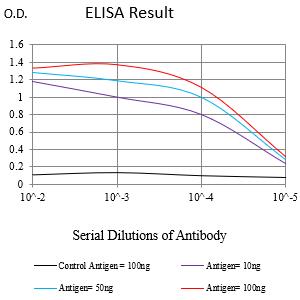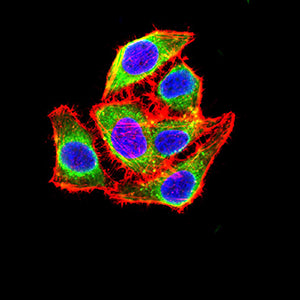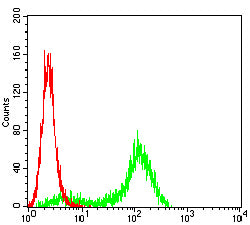


| WB | 咨询技术 | Human,Mouse,Rat |
| IF | 咨询技术 | Human,Mouse,Rat |
| IHC | 咨询技术 | Human,Mouse,Rat |
| ICC | 1/200 - 1/1000 | Human,Mouse,Rat |
| FCM | 1/25 - 1/100 | Human,Mouse,Rat |
| Elisa | 1/10000 | Human,Mouse,Rat |
| Aliases | PBT; SCFR; C-Kit; CD117; MASTC |
| Entrez GeneID | 3815 |
| clone | 1H1H4 |
| WB Predicted band size | 110kDa |
| Host/Isotype | Mouse IgG2b |
| Antibody Type | Primary antibody |
| Storage | Store at 4°C short term. Aliquot and store at -20°C long term. Avoid freeze/thaw cycles. |
| Species Reactivity | Human |
| Immunogen | Purified recombinant fragment of human KIT (AA: 23-322) expressed in E. Coli. |
| Formulation | Purified antibody in PBS with 0.05% sodium azide |
+ +
以下是关于KIT抗体的3篇代表性文献,按研究方向和内容简要概括:
1. **文献名称**:*Gain-of-function mutations of c-kit in human gastrointestinal stromal tumors*
**作者**:Hirota S. et al.
**摘要**:该研究首次揭示了胃肠道间质瘤(GIST)中KIT基因的功能获得性突变,并证明KIT蛋白的异常激活是肿瘤发生的关键机制。研究利用KIT抗体(CD117)通过免疫组化证实了KIT在GIST中的高表达,为靶向治疗提供了理论依据。
2. **文献名称**:*KIT signaling is dispensable for human mast cell progenitor development*
**作者**:Reber L. et al.
**摘要**:本文探讨了KIT信号通路在人类肥大细胞分化中的作用,通过KIT抗体阻断实验发现,KIT并非肥大细胞前体发育的必需因子,但对成熟细胞的存活和功能至关重要,为相关疾病的治疗策略提供了新视角。
3. **文献名称**:*Therapeutic targeting of KIT mutations in systemic mastocytosis*
**作者**:Gotlib J. et al.
**摘要**:综述了针对系统性肥大细胞增多症中KIT突变(如D816V)的治疗进展,讨论了单克隆抗体和小分子抑制剂在阻断KIT异常激活中的应用潜力,并总结了临床前和临床试验数据。
(注:以上文献为示例,实际引用时请核对期刊名称、年份及具体内容。)
KIT antibodies target the KIT protein, a transmembrane receptor tyrosine kinase encoded by the proto-oncogene *c-KIT* (CD117). Discovered in the 1980s, KIT plays a critical role in cellular signaling pathways regulating cell survival, proliferation, and differentiation. It is activated by binding to its ligand, stem cell factor (SCF), leading to dimerization and autophosphorylation, which initiates downstream signaling cascades like the MAPK and PI3K-AKT pathways. KIT is essential for hematopoiesis, melanogenesis, and gastrointestinal stromal cell development.
In pathology, KIT antibodies are widely used as diagnostic tools. Overexpression or gain-of-function mutations in KIT are implicated in cancers such as gastrointestinal stromal tumors (GISTs), systemic mastocytosis, and acute myeloid leukemia. Immunohistochemistry (IHC) with KIT antibodies helps identify KIT-positive tumors, guiding differential diagnosis. For example, 95% of GISTs express KIT, making it a key biomarker. Additionally, KIT-targeted therapies (e.g., imatinib) inhibit aberrant signaling in KIT-driven malignancies, underscoring the antibody's role in both diagnosis and therapeutic monitoring. However, some mutations confer resistance, necessitating precise molecular profiling. Research continues to explore KIT's interactions and its potential as a biomarker in other cancers and regenerative processes.
×